by [email protected] | Sep 8, 2021 | Prescriptions for your Practice
Podcast: Play in new window | Download
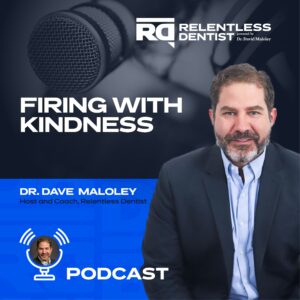 “The day firing becomes easy is the day to fire yourself.” — Tom Peters
“The day firing becomes easy is the day to fire yourself.” — Tom Peters
Kid you not — firing someone is never easy. It’s not only the investment in training, tools, and all things to help them grow, but more importantly, the emotional investment not just by you but by the whole team. And if letting go of your people becomes frequent, it makes you question your hiring process, the work culture, and even yourself. There’s nothing worse than having to fire someone. It’s agonizing but necessary, especially if it’s already ill-affecting the workplace. So the question is, what’s the nicest way to let go of an employee?
In this episode, I will share TIPS (not legal advice) on how to fire someone in the nicest way possible. Like I mentioned a few podcasts back, your goal is to provide your employees with all the training, tools, and support needed to prepare them for their future employment. You can’t keep them forever. The best compensation you can give your employees is to contribute to their employability.
Tune in and find solutions to common practice issues at Prescriptions for Your Practice.
Key Quotes:
- If you get the culture right, it becomes an immune system.
- Firing gets easier, but it’s never easy because we care about these people. Essentially, hiring them is betting on their success.
- Sometimes people slip through the cracks. You hired right, you onboarded them right, you gave them all the tools and the training to succeed, and they’re just not a fit — either culture-wise, productivity-wise, or both.
- There are some people in our organizations that aren’t going to be productive; they’re not going to be culture fits or a combination of them.
- In today’s day and age, you need some litigation protection support, and it’s a good idea to consult an attorney before you fire somebody.
- If you’re going to terminate somebody, it should not surprise them or the other team members.
- Your number one job is to defend the mission and culture.
- If anyone is underperforming for a lengthy amount of time, they are not comfortable at work; they are just there to get the money.
- Even your best performer can go and turn on you.
- If somebody is not contributing and is eroding the culture, then you must let the person go.
Featured on the Show:
- I appreciate your feedback. Let me know what you learned and loved here: [email protected].


by [email protected] | Sep 1, 2021 | Prescriptions for your Practice
Podcast: Play in new window | Download
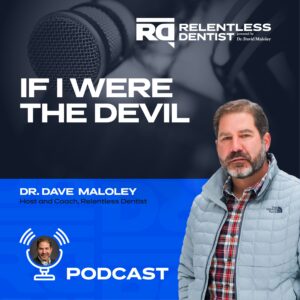 “If I were the devil, I’d soon have families at war with themselves, churches at war with themselves and nations at war with themselves until each, in its turn, was consumed.” — Paul Harvey
“If I were the devil, I’d soon have families at war with themselves, churches at war with themselves and nations at war with themselves until each, in its turn, was consumed.” — Paul Harvey
I’m not being political, religious, or whatnot, but Paul’s strong message in his 1965 broadcast has proven to be prophetic — how elements of good and evil are at play in constant dynamic throughout global history. You might think these are inevitable in the grand scheme of things, but these are more imminent in our practice. One thing is clear — an organization is created or destroyed from the inside out. Hence, the critical question right now is, “Where do we go from here?”.
In this episode, I’ll dive into the psychology of destroying the practice from the inside. Then, I’ll cover the four elements you need to stop to avoid negativity and toxicity in your practice. Ultimately, it would help if you quickly diagnose when your mind isn’t serving you and your goals, patients, and vision before falling into the dark side.
Tune in and find solutions to common practice issues at Prescriptions for Your Practice.
Key Quotes:
- If we know how to destroy a dental practice, we know how to build it up very quickly.
- Stop your blame. It’s your practice, and if you blame other things, outside forces, you’re giving away the power to create a vision and bring it into reality.
- If you’re in a conversation with villains and heroes, no one’s coming to save you. That’s a position of weakness, and we have to get you back into creator mode.
- My practice is not limited by its opportunity. It’s limited by its leader.
- Excuses and reasons are just an attempt to lessen the blame that you’re attaching to yourself after a mistake, a mishap, a wrongdoing, an upset patient.
- If you can change the situation, then do it. If you can’t, then you are forced to accept it.
- Stop speaking ill of others even if you feel that they deserve it.
- Being 100 percent responsible doesn’t mean beating yourself up.
- We need better leaders in these wild times.
Featured on the Show:


by [email protected] | Aug 25, 2021 | Prescriptions for your Practice
Podcast: Play in new window | Download
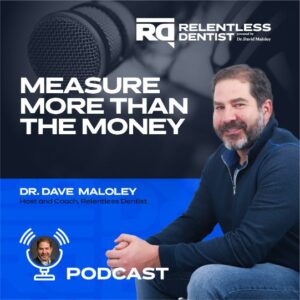
“Not everything that can be counted counts, and not everything that counts can be counted.” — Albert Einstein
Money is necessary to put up and run a practice — we can’t argue with that. But, it is not the be-all and end-all. The money supports our basic needs, goals, and security, but it cannot create a purpose in and of itself — and that’s what I want to talk about today.
In this episode, I will share with you things that are not necessarily money-centered but can provide a significant impact on your business and even drive profits. These key indicators that aren’t focused on a dollar figure but are profit-magnets will keep you, and your staff performs at their best.
Tune in and find solutions to common practice issues at Prescriptions for Your Practice.
Key Quotes:
- “If we treat money as a math game, we lose track of what really drives profits.”
- “If a business is human-centered, you can have all of the profits that you want. But if a business is profit-centered, then you’ll end up invariably taking advantage of people.”
- “Trust, enthusiasm, and value are all emotional events. And employees’ morale and motivation drive productivity. Your energy and focus and stack of skills drive business growth.”
- “A bad day for you can turn into a rut, and a rut can turn into a pit.”
- “You can’t expect your team to be enthusiastic about their job if you’re checked out. The tone is set at the top.”
- “You should be mindful about what you’re putting into your eyes and your ears.”
- “The key components of a strong culture are safety, hope, optimism, resiliency, and efficacy.”
- “What keeps you enthusiastic will keep you productive.”
- “Referrals are the most viable thing in your business.”
- “Case acceptance starts at the moment somebody hears about you.”
- “A strong referral system can double or triple your marketing return on investment.”
Featured on the Show:
- I appreciate your feedback. Let me know what you learned and loved here: [email protected].


by [email protected] | Aug 18, 2021 | Prescriptions for your Practice
Podcast: Play in new window | Download
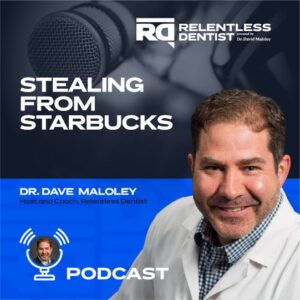 Ok, sit down and hold your horses (or cup?); I’m not suggesting that you commit a crime (pretty far from that). But, while I had your attention, let’s talk about Starbucks. Did you ever wonder how Starbucks redefined the coffee experience? Can you provide a similar experience in your dental practice?
Ok, sit down and hold your horses (or cup?); I’m not suggesting that you commit a crime (pretty far from that). But, while I had your attention, let’s talk about Starbucks. Did you ever wonder how Starbucks redefined the coffee experience? Can you provide a similar experience in your dental practice?
Starbucks has brought in disruptive innovation. It was so phenomenal that it created a niche market and cult following — and of course, competitors. Yet, despite the competition, it has remained steadfast and continues to expand immensely, offering the same consistent products and services wherever you are in the world.
This episode will talk about valuable lessons that you can “steal” from Starbucks to create a patient experience that you will be proud of. I’ll also share tips on finding good team members and keeping them away from the prying eyes of your competitors. So relax, listen to my podcast while enjoying a cup.
Tune in and find solutions to common practice issues at Prescriptions for Your Practice.
Key Quotes:
- “Competition is no longer the dentist down the street. It’s anyone who employs good people.”
- “You have to provide an employer brand that gives these people who want good jobs the upside.”
- “We should go into our day-to-day as a student or as a consultant.”
- “Your top customers are the people on your payroll.”
- “Highly compassionate, highly motivated, hungry, humble, and smart employees want to create their own personalized experience for the patients that walk in your door.”
- “One goal for you and your team is to make sure that every patient feels like the only patient on the schedule.”
- “Your number one job is to make sure that everyone on the team sees the vision, mission, and values as the boss.”
- “Make sure everything is congruent and consistent in your practice with the identity you want out in the marketplace.”
- “The customer isn’t always right.”
- “Good team members are really hard to replace. So make sure that you’re pouring into your team members and you understand that if you treat them as a level 10, they’ll treat your patient as a level 10.”
- “You’ll find that most of the big insights you get, the big wins you get in dentistry, you take from other industries.”
- “Most people are not willing to do what you’re willing to do, and that’s the ultimate competitive advantage — is to create unique value in your communities.”
Featured on the Show:


by [email protected] | Jun 23, 2021 | Prescriptions for your Practice
Podcast: Play in new window | Download
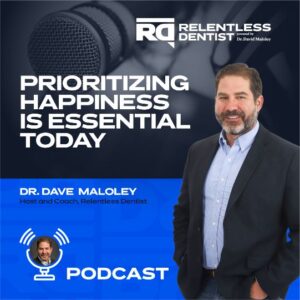
Prioritizing Happiness Is Essential Today
Money won’t make you happy, but happiness will make you money.
At this point in your life, you must be able to distinguish pleasure from happiness. Although both bring joy and good feelings, they produce contrasting outcomes. Pleasure is momentary and visceral, while happiness is long-lasting and transcendental.
Listen in as I dig deeper into the realities of happiness. We will talk about positive psychology and the narcissism epidemic brought about by the disruption in social media. We’ll also look at how we can prioritize happiness, what it looks like tactically, and what you can do to guarantee a culture of happiness in your practice.
Tune in and find solutions to common practice issues at Prescriptions for Your Practice.
Key Quotes:
- “How do we get so unhappy? This is not an ok thing to do, but it almost becomes a norm.”
- “We see it on social media all of the time where people lose their minds and hurt people. They unleash on someone else in a situation that doesn’t call for it.”
- “We need to figure out ways not only to get to function but how do we get to high function.”
- “Most of my adult life, I spent on this “I’ll be happy when” treadmill.”
- “I need to supplement my natural behaviors with tools that allow me to enjoy the day and the now and be more present.”
- “The one thing that’s taking us down right now is technology.”
- “We’re utilizing technology tools to help leverage and make our lives better, but if we’re not careful, it can be super destructive.”
- “Social media, the more we use it, the lonelier we get. We call it social, but it’s not social at all.”
- “In a dental practice, the five people that most likely you will spend your time with are the people on your payroll, so you have to be very selective.”
- “Happiness is a continuum.”
Featured on the Show:


 “The day firing becomes easy is the day to fire yourself.” — Tom Peters
“The day firing becomes easy is the day to fire yourself.” — Tom Peters


 “If I were the devil, I’d soon have families at war with themselves, churches at war with themselves and nations at war with themselves until each, in its turn, was consumed.” — Paul Harvey
“If I were the devil, I’d soon have families at war with themselves, churches at war with themselves and nations at war with themselves until each, in its turn, was consumed.” — Paul Harvey
 Ok, sit down and hold your horses (or cup?); I’m not suggesting that you commit a crime (pretty far from that). But, while I had your attention, let’s talk about Starbucks. Did you ever wonder how Starbucks redefined the coffee experience? Can you provide a similar experience in your dental practice?
Ok, sit down and hold your horses (or cup?); I’m not suggesting that you commit a crime (pretty far from that). But, while I had your attention, let’s talk about Starbucks. Did you ever wonder how Starbucks redefined the coffee experience? Can you provide a similar experience in your dental practice?